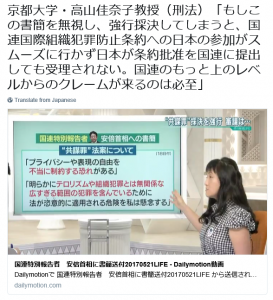 「共謀罪」法案に対する国連からの警告をも無視し突っ走る政府
「共謀罪」法案に対する国連からの警告をも無視し突っ走る政府
この法案をめぐっての日本政府の対応を国連特別報告者が批判。
「特別報告者」は、国連人権理事会に任命される独立した立場の専門家だ。国やテーマごとに監視し、理事会に報告する。
国連のプライバシー権に関する特別報告者のジョセフ・ケナタッチ氏が、共謀罪法案についての書簡を5月18日付で安倍晋三首相に送付。
書簡では、同法案がプライバシーや表現の自由を制限するおそれがある、と指摘。対象となる277の犯罪にはテロや組織犯罪とは無関係なものがあり、法律が恣意的に適用される危険性への懸念を訴えている。
書簡は、国連人権高等弁務官事務所のホームページで公開された。こちら
日本政府は、この書簡に強い拒否反応を示した。菅義偉官房長官は5月22日、「一方的に発出された。不適切なもので、外務省を通じて強く抗議を行っている」と述べ、こうも語った。「特別報告者という立場ですけれども、個人の資格で人権状況の調査報告を行う立場であり、国連の立場を反映するものではない」
経過:東京新聞より
【ロンドン=小嶋麻友美】安倍晋三首相宛ての公開書簡で、「共謀罪」の趣旨を含む組織犯罪処罰法改正案に懸念を表明した国連のプライバシー権に関する特別報告者ジョセフ・ケナタッチ氏は二十二日、菅義偉官房長官が同日の記者会見で抗議したと明らかにした日本政府の対応を「中身のないただの怒り」と批判し、プライバシーが侵害される恐れに配慮した措置を整える必要性をあらためて強調した。電子メールで本紙の取材に答えた。
ケナタッチ氏によると、「強い抗議」は十九日午後、国連人権高等弁務官事務所を訪れた在ジュネーブ日本政府代表部の職員が申し入れ、その後、約一ページ余りの文書を受け取った。しかし、内容は本質的な反論になっておらず「プライバシーや他の欠陥など、私が多々挙げた懸念に一つも言及がなかった」と指摘した。
抗議文で日本側が、国際組織犯罪防止条約の締結に法案が必要だと述べた点について、ケナタッチ氏は「プライバシーを守る適当な措置を取らないまま、法案を通過させる説明にはならない」と強く批判。法学者であるケナタッチ氏自身、日本のプライバシー権の性質や歴史について三十年にわたって研究を続けてきたとし、「日本政府はいったん立ち止まって熟考し、必要な保護措置を導入することで、世界に名だたる民主主義国家として行動する時だ」と訴えた。
ケナタッチ氏は日本政府に引き続き、法案の公式な英訳文とともに説明を求めている。菅官房長官は二十二日、ケナタッチ氏の書簡に「不適切だ」と反論していた。
<国連特別報告者> 国連人権理事会から任命され、特定の国やテーマ別に人権侵害の状況を調査したり、監視したりする。子どもの人身売買や、表現の自由に関する人権状況などの報告者がいる。政府や組織などから独立した専門家で、調査結果は理事会に報告する。
Reutersより Japan protests against U.N. expert’s queries on bill to fight terrorism
By Linda Sieg | TOKYO TOKYO Japan on Monday protested against a letter to Prime Minister Shinzo Abe from a U.N expert raising concerns that planned legislation targeting conspiracies to commit terrorism and other crimes could allow police to trample civil liberties. The protest by Chief Cabinet Secretary Yoshihide Suga drew a stiff rejoinder from Joseph Cannataci, U.N. special rapporteur on the right to privacy, who blasted Suga's comments as "angry words" with "no substance" in an email to Reuters. The lower house of Japan's parliament is expected to approve the bill as early as Tuesday, setting the stage for enactment. Tokyo says the legal changes are needed to ratify a U.N. treaty aimed at battling international organized crime and fighting terrorism, as Tokyo prepares to host the 2020 Olympics. Opponents see the proposals as part of Abe's agenda to tighten the government's grip at the expense of individual rights. The content of the May 18 letter from Cannataci was "clearly inappropriate and we strongly protested," Suga said. "It is not at all the case that the legislation would be implemented arbitrarily so as to inappropriately restrict the right to privacy and freedom of speech," he added. In the letter released on the website of the Office of the U.N. High Commissioner for Human Rights, Cannataci referred to concerns that the bill's broad scope might "lead to undue restrictions to the rights to privacy and to freedom of expression". He asked Abe for information on the accuracy of such concerns and the compatibility of the draft law with international human rights norms and standards. "Unless and until corrected on any point of fact, I stand by every single word, fullstop and comma of what I wrote to Prime Minister Shinzo Abe," Cannataci wrote in his email. "There is absolutely no justification for the Japanese Government to behave in this way and push through seriously defective legislation in such a rush." Critics including the Japan Federation of Bar Associations have also warned the changes, combined with a recent widening of legal wiretapping and courts' reluctance to rein in police surveillance powers, could deter grassroots opposition to government policies. The lawyers' group has expressed concern that ordinary citizens would be targeted, despite government assurances to the contrary, and that the crimes governed by the law include acts unrelated to organized crime or terrorism. Japanese governments have tried to pass similar legislation three times since 2000, when the United Nations adopted a Convention against Transnational Organised Crime. But Abe's ruling coalition, with a two-thirds majority in both houses of parliament, looks likely to enact the bill this time, despite loud opposition protests. A Kyodo news agency survey published on Sunday showed voters are split over the controversial bill, with support at 39.9 percent and opposition at 41.4 percent. (Reporting by Linda Sieg; Editing by Clarence Fernandez)
<中日新聞より>
プライバシー守る措置を ケナタッチ氏「日本、懸念に答えず」
【ロンドン=小嶋麻友美】公開書簡で組織犯罪処罰法改正案に懸念を表明したジョセフ・ケナタッチ氏は二十二日、菅義偉官房長官が同日の記者会見で抗議したと明らかにした日本政府の対応を「中身のないただの怒り」と批判し、プライバシーが侵害される恐れに配慮した措置を整える必要性をあらためて強調した。
電子メールで本紙の取材に答えた。
ケナタッチ氏によると、「強い抗議」は十九日午後、国連人権高等弁務官事務所を訪れた在ジュネーブ日本政府代表部の職員が申し入れ、その後、約一ページ余りの文書を受け取った。しかし、内容は本質的な反論になっておらず「プライバシーや他の欠陥など、私が多々挙げた懸念に一つも言及がなかった」と指摘した。
抗議文で日本側が、国際組織犯罪防止条約の締結に法案が必要だと述べた点について、ケナタッチ氏は「プライバシーを守る適当な措置を取らないまま、法案を通過させる説明にはならない」と強く批判。法学者であるケナタッチ氏自身、日本のプライバシー権の性質や歴史について三十年にわたって研究を続けてきたとし、「日本政府はいったん立ち止まって熟考し、必要な保護措置を導入することで、世界に名だたる民主主義国家として行動する時だ」と訴えた。
ケナタッチ氏は日本政府に引き続き、法案の公式な英訳文とともに説明を求めている。
4/26に参考人として意見陳述を行った高山佳奈子教授は、もの言いが論理的、きっぱり、お顔もかわいいのでその後マスコミに登場する。
政府のトンチンカンな対応に対しても、手厳しい問題提起をしている。さてどうなるか??
京都大学・高山佳奈子教授(刑法)「もしこの書簡を無視し、強行採決してしまうと、国連国際組織犯罪防止条約への日本の参加がスムーズに行かず日本が条約批准を国連に提出しても受理されない。国連のもっと上のレベルからのクレームが来るのは必至」
<高山先生の4/26意見陳述> 高山教授20170523
ケナタッチ国連特別報告者が菅義偉官房長官の抗議に再反論 (産経新聞)
国連特別報告者のケナタッチ氏が「テロ等準備罪」を新設する組織犯罪処罰法改正案に懸念を示した問題で、民進党はケナタッチ氏が菅義偉官房長官の抗議に再反論した声明を入手し、23日の法務部会で公開した。声明全文は次の通り。
◇
私の書簡は、特に日本政府が今回の法案を十分な期間の公的議論(public consultation)を経ず、提案された諸施策について許容される十分な考慮もないままに、法案を早急に成立させることを愚かにも決定したという状況においては、完全に適切なものです。
私が日本政府から受け取った「強い抗議」は、ただ怒りの言葉が並べられているだけで、全く中身のあるものではありませんでした。その抗議は、私の書簡の実質的内容について、1つの点においても反論するものではありませんでした。この抗議は、プライバシー権に関する私が指摘した多くの懸念またはその他の法案の欠陥について、ただの1つも向き合ったものではありません。
私はその抗議を受けて、5月19日の朝、次のような要望を提出しました。
「日本政府には、法案の公式英語訳を提供することが望まれます。その上で日本政府には、当該法案のどこに、どの部分に、あるいは既存の他の法律のどの部分に、新しい法律が、私の書簡で示唆しているものと同等のプライバシー権の保護と救済が含まれているのか、または他の法律によりカバーされているのか示していただきたいです。私は、私の書簡の内容について不正確であると証明されれば、当該部分については公開の場で喜んで撤回いたします」
日本政府は、これまでの間、実質的な反論や訂正を含むものを何一つ送付してくることができませんでした。いずれかの事実について訂正を余儀なくされるまで、私は、安倍晋三首相に向けて書いた書簡における、すべての単語、ピリオド、コンマに至るまで維持し続けます。日本政府がこのような手段で行動し、これだけ拙速に深刻な欠陥のある法案を押し通すことを正当化することは絶対にできません。
日本政府が、その抗議において、繰り返し多用する主張は、2020年の東京オリンピックに向けて国連越境組織犯罪防止条約を批准するためにこの法案が必要だというものでした。
しかし、このことは、プライバシーの権利に対する十分な保護もないこの法案を成立することを何ら正当化するものではありません。日本が国連条約に批准することを可能にし、同時に、日本がプライバシー権および基本的人権の保護の分野でリーダーとなる機会を付与する法案(それら保護が欠如していることで日本を目立たせる法案ではなく)を起草することは確実に可能です。
私は日本およびその文化に対して深い愛着をもっています。さらに、私は日本におけるプライバシー権の性質および歴史についてこれまで調査してきており、30年以上にわたるプライバシー権とデータ保護に関する法律の発展を追跡してきたものです。私は、日本が高い人権基準を確立し、この地域における他の国々および国際社会全体にとってよい前例を示していただけるものと期待しております。ですので、私が先の書簡を書かなければならなかったことは、私にとって大いなる悲しみであり、不本意なことでした。
現在の段階において、ただ一つの望みは、日本政府が私の書簡で触れたプライバシーの権利に着目した保護と救済の制度に注意を払い、法案の中に導入することです。私が書簡にて述べましたとおり、私は日本政府が私の支援の申し出を受け入れてくださるのであれば、日本政府がさらに思慮深い地位へと到達できるように喜んでお手伝いをさせていただきます。今こそ日本政府は、立ち止まって内省を深め、よりよい方法で物事をなすことができることに気付くべき時なのです。私が書簡にてアウトラインをお示ししたすべての保護措置を導入するために、必要な時間をかけて、世界基準の民主主義国家としての道に歩を進めるべき時です。日本がこの道へと進む時、私は全力を尽くして支援することといたしましょう。
Special Rapporteur on the right to privacy |
|
|
HTMLCountry3
A Special Rapporteur is an independent expert appointed by the Human Rights Council to examine and report back on a country situation or a specific human rights theme.This position is honorary and the expert is not United Nations staff nor paid for his/her work. The Special Rapporteurs are part of the Special Procedures of the Human Rights Council. Introduction In July 2015, the Human Rights Council appointed Prof. Joseph Cannataci of Malta as the first-ever Special Rapporteur on the right to privacy.The appointment is for three years. Mandate The Special Rapporteur is mandated by Human Rights Council Resolution 28/16:(a ) To gather relevant information, including on international and national frameworks, national practices and experience, to study trends, developments and challenges in relation to the right to privacy and to make recommendations to ensure its promotion and protection, including in connection with the challenges arising from new technologies;(b ) To seek, receive and respond to information, while avoiding duplication, from States, the United Nations and its agencies, programmes and funds, regional human rights mechanisms, national human rights institutions, civil society organizations, the private sector, including business enterprises, and any other relevant stakeholders or parties;(c ) To identify possible obstacles to the promotion and protection of the right to privacy, to identify, exchange and promote principles and best practices at the national, regional and international levels, and to submit proposals and recommendations to the Human Rights Council in that regard, including with a view to particular challenges arising in the digital age;(d ) To participate in and contribute to relevant international conferences and events with the aim of promoting a systematic and coherent approach on issues pertaining to the mandate;(e) To raise awareness concerning the importance of promoting and protecting the right to privacy, including with a view to particular challenges arising in the digital age, as well as concerning the importance of providing individuals whose right to privacy has been violated with access to effective remedy, consistent with international human rights obligations;(f) To integrate a gender perspective throughout the work of the mandate;(g) To report on alleged violations, wherever they may occur, of the right to privacy, as set out in article 12 of the Universal Declaration of Human Rights and article 17 of the International Covenant on Civil and Political Rights, including in connection with the challenges arising from new technologies, and to draw the attention of the Council and the United Nations High Commissioner for Human Rights to situations of particularly serious concern;(h) To submit an annual report to the Human Rights Council and to the General Assembly, starting at the thirty-first session and the seventy-first session respectively. |
|


